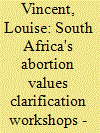| Srl | Item |
| 1 |
ID:
187988


|
|
|
|
|
| Summary/Abstract |
The reproductive healthcare system is meagre in the ethnic communities of Bangladesh. Notwithstanding the availability of studies on the healthcare-seeking behaviour of ethnic groups in Bangladesh, studies explicitly focused on the social networks of ethnic women, and their likely influences on reproductive health in this context are rare. We analyse how social networks impact ethnic women’s reproductive healthcare-seeking behaviour in Bangladesh. A total of 205 married ethnic—Garo and Mandai—women were selected purposively from Madhupur Upazila in the Tangail district. Data were collected through face-to-face interviews using a structured interview schedule. Descriptive statistics show that the average score of reproductive healthcare-seeking behaviour of Garo and Mandai women is low (40 out of 70), and the average network size of that women is slightly small (2.58). Results from hierarchical multiple regression models show that, next to years of schooling, reproductive health-related training and membership status, network size is positively related, while reproductive health constraints are negatively related, and ethnicity is not statistically associated with reproductive healthcare-seeking behaviour of Garo and Mandai women. This study reveals that social networks of ethnic women may improve their reproductive healthcare-seeking behaviour in Bangladesh. Hence, the policy recommendation is that social network agents are more equipped with reproductive health-related knowledge and information.
|
|
|
|
|
|
|
|
|
|
|
|
|
|
|
|
| 2 |
ID:
106373


|
|
|
|
|
| Publication |
2011.
|
| Summary/Abstract |
A rich literature exists on local democracy and participation in South Africa. While the importance of participation is routinely built into the rhetoric of government, debate has increasingly focused on the dysfunctionality of participatory mechanisms and institutions in post-apartheid South Africa. Processes aimed ostensibly at empowering citizens, act in practice as instruments of social control, disempowerment and cooptation. The present article contributes to these debates by way of a critique of the approach used by the South African state, in partnership with the non-governmental sector, in what are called abortion 'values clarification' (VC) workshops. This article examines the workshop materials, methodology and pedagogical tools employed in South African abortion VC workshops which emanate from the organization Ipas - a global body working to enhance women's sexual and reproductive rights and to reduce abortion-related deaths and injuries. VC workshops represent an instance of a more general trend in which participation is seen as a tool for generating legitimacy and 'buy-in' for central state directives rather than as a means for genuinely deepening democratic communication. The manipulation of participation by elites may serve as a means to achieve socially desirable goals in the short term but the long-term outlook for a vibrant democracy invigorated by a knowledgeable, active and engaged citizenry that is accustomed to being required to exercise careful reflection and to its views being respected, is undermined. Alternative models of democratic communication, because they are based on the important democratic principles of inclusivity and equality, have the potential both to be more legitimate and more effective in overcoming difficult social challenges in ways that promote justice.
|
|
|
|
|
|
|
|
|
|
|
|
|
|
|
|